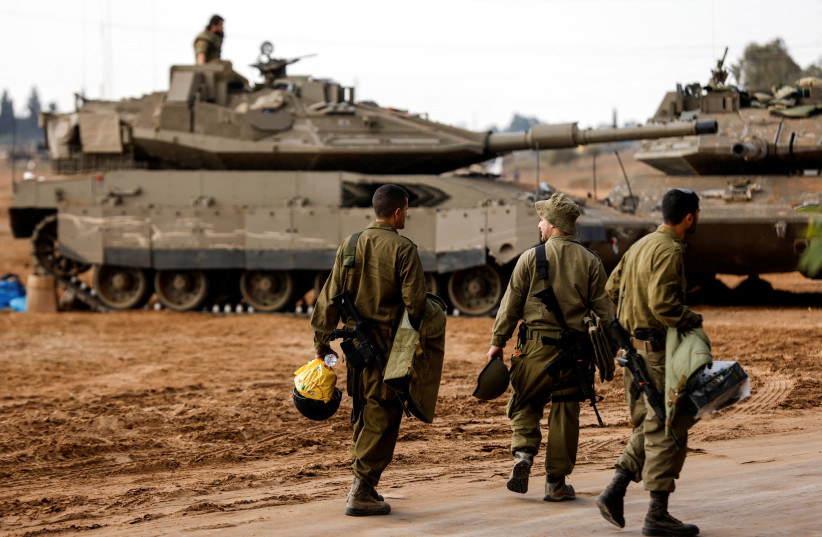Chaos could reign in Gaza unless Israel immediately implements a day-after plan for the enclave, US Secretary of State Antony Blinken told reporters on Wednesday, as Israel speculated that its war against Hamas could last for another seven months.
“In the absence of a plan for the day after, there won’t be a plan for the day after,” he said during a press conference in Moldova.
“We need to get, as quickly as possible, a plan for the day after that does not leave Israel responsible for Gaza,” Blinken said.
If Israel’s army remains in charge of Gaza due to the lack of a plan, the Gaza war would be reduced to a perpetual low-level conflict in which Israel will “have an enduring insurgency on its hands for as far as one can see into the future,” Blinken said.
The result, he continued, is that “we’ll have chaos, lawlessness, and a vacuum that eventually will be filled again by Hamas, or maybe, if it’s possible to imagine, even worse Jihadists.

Prime Minister Netanyahu under increased pressure
He spoke as Prime Minister Benjamin Netanyahu is under increased domestic and international pressure to find a way to end the war or at least clearly outline a near-term end game.
The problematic nature of this stretch of the war, in which Israel is going after Hamas battalions in Rafah, was outlined earlier this week when its targeted strike against two significant Hamas officials inadvertently sparked a fire in a nearby tent camp, killing 45 people.
It followed the IDF’s success on the battlefield, with an Israeli military official stating that the army had achieved tactical control over the strategic Philadelphi Corridor that runs along the border between the Gaza Strip and Egypt.
The official said that in 10 days, the Israeli military’s operation in the Rafah area has discovered 20 tunnels that cross into Egypt and that this information was passed on to Egypt.
National Security Adviser Tzachi Hanegbi told KAN News on Wednesday that it was critically important for Israel to control the Philadelphi Corridor and to destroy the tunnels between Gaza and Egypt, through which so many weapons had flowed to Hamas.
“We must close the border between Egypt and Gaza,” Hanegbi said.
He pushed back at international calls to end the war before Hamas was defeated, explaining that Israel was in an existential battle in which it had no choice.
“We have another seven months of fighting” to cement the IDF’s achievements and ensure ‘the destruction of the governmental and military capabilities of Hamas,” he said.
Hanegbi clarified that the IDF must maintain security control over Gaza because no other entity or country would be willing to put boots on the ground to ensure that Gaza doesn’t pose a threat to Israel.
But once Hamas is gone, Gaza should be ruled by new civilian Palestinian leadership that won’t be connected to terror or Hamas, he said.
Netanyahu, in a meeting with visiting former US ambassador to the UN Nikki Haley, spoke of the need for complete victory over Hamas and promised to secure the release of the remaining hostages.
In Moldova, however, Blinken questioned how much more Israel could achieve militarily without a day-after plan, warning that it had to weigh those military gains against the potential humanitarian cost to Palestinian civilians.
The Biden administration has urged the IDF to focus on limited strikes, such as the one that took out the two significant Hamas officials on Sunday, but noted that even those actions had severe civilian consequences. He stressed that it was important for Israel to quickly finish its investigation into that incident and ensure accountability.
“We see that even limited, focused, targeted attacks, designed to deal with terrorists who have killed innocent civilians… even those kinds of operations can have terrible, horrific, unintended consequences,” he said.
“I think it’s very important, at this moment, after Israel has had real success in helping to destroy Hamas’s capacity to repeat October 7 … it has to ask, and especially in the absence of a plan for the day after in Gaza,” whether “further incremental gains against Hamas” stack up against the unintended consequences of military action in crowded civilian areas.
Continued action against Hamas must be coupled with a day-after plan, he stressed.
In Tel Aviv, US Senator Lindsey Graham (R-SC) struck a completely different note as he stressed the importance of completely defeating Hamas.
He accused the Biden administration of not doing enough to support the Jewish state, noting that he had been left with that understanding, after conversations with top Israeli leaders, including Netanyahu and Minister Benny Gantz.
Graham said that the Biden administration is slow-walking critical weapons that Israel needs to defeat Hamas in Gaza, but he refused to specify which weapons he meant.
“I would urge the administration to speed up the delivery of weapons Israel needs to win a war they can’t afford to lose,” he emphasized.
France’s President Emmanuel Macron called Palestinian Authority President Mahmoud Abbas to express his condolences over the Rafah civilian death. Both leaders called for the IDF to halt is military operation in Rafah.
Macron said his country was pushing for a UN Security Council resolution to that effect. He added that there should be an end to the “systematic postponement” both of the implementing of a two-state solution in Israeli-Palestine and of the setting up of a Palestinian state.
“(Macron) asserted France’s commitment to work, with its European and Arab partners, on a shared vision of peace that offers security guarantees to Palestinians and Israelis,” the French presidential palace said in a statement in the wake of a phone exchange between the French president and his Palestinian counterpart Mahmoud Abbas.
This process should entail “a perspective of recognizing the Palestinian State in a useful dynamic,” the Elysee added.
Reuters contributed to this report.
Reuters contributed to this report.
